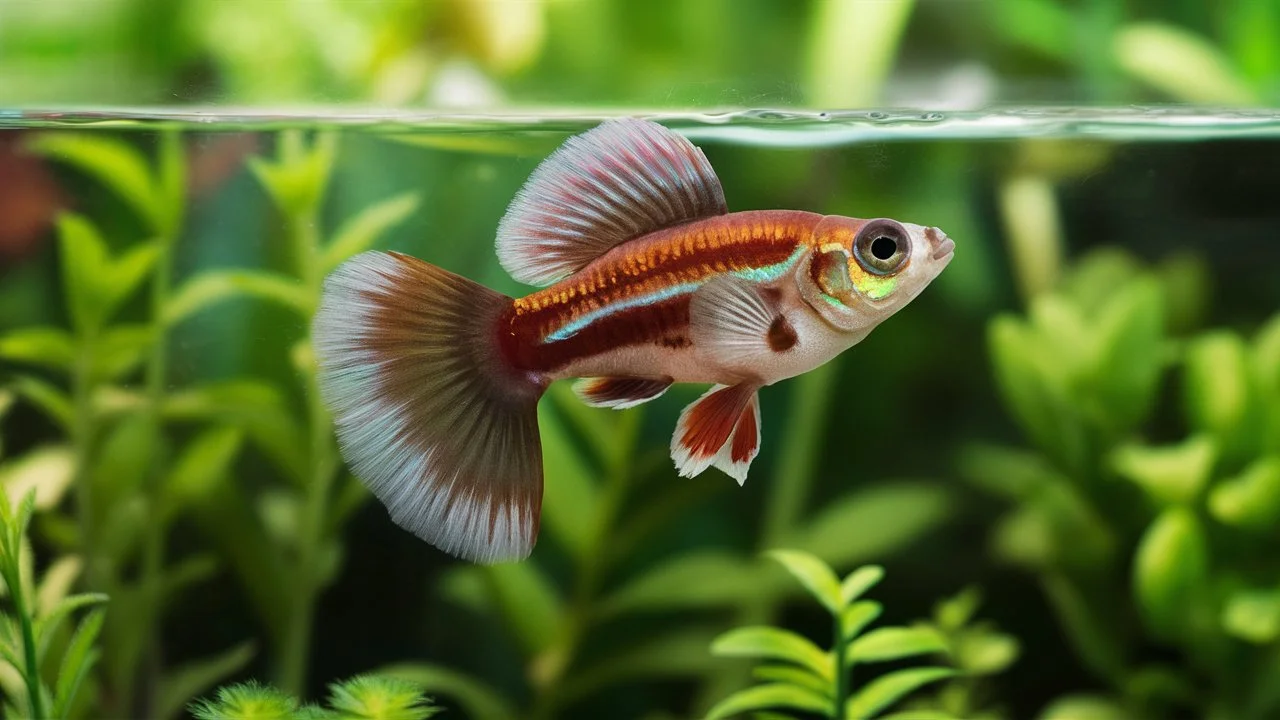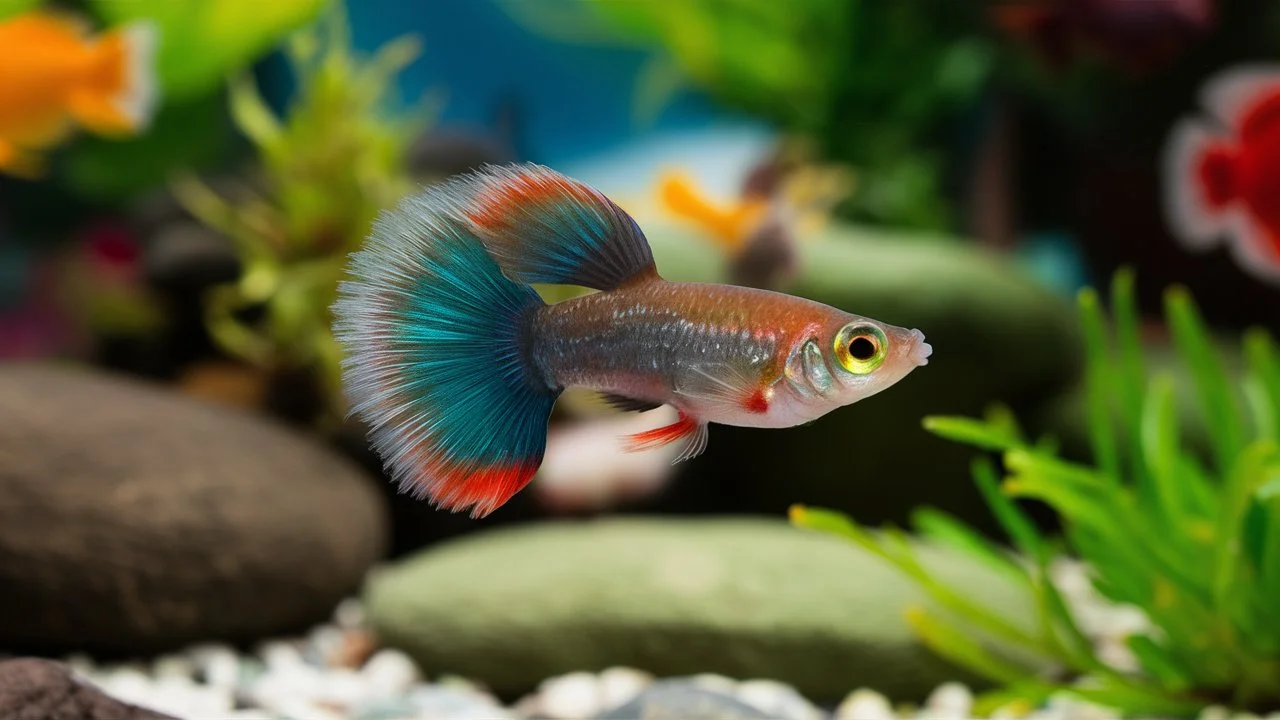When it comes to feeding pet fish, understanding their dietary needs is crucial for their health and wellbeing. Among the popular choices for aquarium enthusiasts are guppies, known for their vibrant colors and lively behavior. A common question that arises is whether guppies are omnivores or herbivores.
This question isn’t just academic; the answer impacts how you should feed and care for these fish. By exploring the natural diet of guppies, their feeding habits in the wild, and the nutritional components they require, we can better understand their dietary classification and ensure they thrive in a home aquarium setting. Let’s dive into the fascinating world of guppy nutrition to determine if these colorful fish are omnivores or herbivores.
Guppies are omnivores. They consume a varied diet that includes both plant-based and animal-based foods. In their natural habitat, guppies feed on algae, plant matter, small insects, and crustaceans. To keep them healthy in an aquarium, provide a balanced diet that includes high-quality fish flakes, live or frozen foods like brine shrimp and daphnia, and occasional vegetables such as blanched peas and spinach.
Are Guppies Omnivores or Herbivores?
Guppies are small, colorful fish that many people love to keep in their aquariums. But what do they eat? Are they omnivores or herbivores? Let’s dive deep into the world of guppies and explore their diet in simple, easy-to-understand language.
Related reading: What Human Food Can Guppies Eat?

What Are Guppies?
Guppies, also known as millionfish, are tiny tropical fish. They come in many bright colors and have beautiful fins. Guppies are very popular in home aquariums because they are easy to take care of and are fun to watch.
Understanding Omnivores and Herbivores
Before we find out what guppies eat, let’s understand the difference between omnivores and herbivores.
- Omnivores: These animals eat both plants and meat. For example, humans are omnivores because we eat vegetables, fruits, and meat.
- Herbivores: These animals eat only plants. Cows and rabbits are good examples of herbivores because they eat grass and vegetables.
What Do Guppies Eat in the Wild?
In the wild, guppies have a varied diet. They eat small insects, algae, and plant matter. This means that guppies eat both plant-based food and animal-based food. So, they are not strictly herbivores.
Guppies Are Omnivores
Because guppies eat both plants and animals, they are classified as omnivores. This is important to know when feeding guppies in an aquarium.
What Do Guppies Eat in an Aquarium?
In an aquarium, guppies can eat a variety of foods to stay healthy. Here’s a list of foods that are good for guppies:
- Flake Food: This is a common food for aquarium fish. It has all the nutrients guppies need.
- Live Food: Guppies love live food like brine shrimp, daphnia, and bloodworms. These provide protein.
- Frozen Food: You can also feed guppies frozen versions of live food.
- Vegetables: Guppies enjoy vegetables like lettuce, peas, and zucchini. These are good sources of fiber.
- Algae: Guppies will nibble on algae in the tank. Algae is a natural part of their diet.
How to Feed Guppies
Feeding guppies is easy, but you need to do it right to keep them healthy.
- Feed Small Amounts: Give guppies small amounts of food 2-3 times a day. They have tiny stomachs and can’t eat a lot at once.
- Variety is Key: Give them a mix of flake food, live food, and vegetables. This ensures they get all the nutrients they need.
- Don’t Overfeed: Overfeeding can make the tank dirty and can harm the fish. Give them only what they can eat in a few minutes.
Signs of a Healthy Diet
A healthy guppy will be active, colorful, and have clear eyes. Here are some signs that your guppy is eating well:
- Bright Colors: Guppies with bright, vibrant colors are usually healthy.
- Active Swimming: Healthy guppies swim around actively and explore their tank.
- Clear Eyes: Their eyes should be clear, not cloudy.
Common Feeding Mistakes
To keep your guppies healthy, avoid these common feeding mistakes:
- Overfeeding: Giving too much food can cause health problems and make the tank dirty.
- Feeding Only One Type of Food: Guppies need a variety of foods to get all the nutrients they need.
- Not Cleaning the Tank: Leftover food can rot and make the water unhealthy for guppies.
Can Guppies Eat Human Food?
Some human foods are safe for guppies, but you need to be careful. Here are some human foods that guppies can eat:
- Boiled Vegetables: Small pieces of boiled peas, carrots, and spinach.
- Fruits: Small bits of banana and apple, but not too much because they have a lot of sugar.
Avoid feeding guppies foods that are spicy, salty, or greasy. These can harm their delicate systems.
Special Diets for Baby Guppies
Baby guppies, also called fry, need special care. They are very small and need tiny food. Here’s what you can feed baby guppies:
- Infusoria: Tiny microorganisms that baby guppies can eat.
- Crushed Flake Food: Crush the flake food into tiny bits.
- Baby Brine Shrimp: These are small enough for baby guppies to eat.
Feeding Tips for Guppy Breeders
If you are breeding guppies, their diet is very important. Here are some tips:
- High-Protein Food: Breeding guppies need more protein. Feed them live food like brine shrimp and bloodworms.
- Frequent Feeding: Breeding guppies can be fed more often, but in small amounts.
What are the Nutritional Needs of Guppies?
Guppies, like all living creatures, require a balanced diet to thrive. Their nutritional needs can be divided into several key components:
1. Protein
Protein is crucial for the growth and repair of tissues. Guppies, especially the young ones, need a high-protein diet. Fish flakes designed for tropical fish typically contain adequate protein, but you can supplement with live or frozen foods like brine shrimp, daphnia, and bloodworms.
2. Fat
Fats provide a concentrated energy source and are important for maintaining a healthy metabolic rate. Quality fish food will contain the right amount of fat, but it’s important not to overfeed, as excess fat can lead to health issues.
3. Carbohydrates
Carbohydrates are another energy source. While guppies can utilize carbohydrates, they should not be the main component of their diet. Foods like spirulina and certain vegetables can provide necessary carbohydrates.
4. Vitamins
Vitamins are essential for overall health and the proper functioning of metabolic processes. Vitamin C and D are particularly important for guppies. Commercial fish foods are usually fortified with necessary vitamins, but it’s beneficial to occasionally supplement their diet with fresh vegetables like peas and spinach.
5. Minerals
Minerals like calcium and phosphorus are vital for bone development and other physiological functions. These can be obtained from a well-balanced commercial diet, but ensuring that the water quality is good and possibly supplementing with mineral-rich foods can be beneficial.
6. Fiber
Fiber aids in digestion and helps prevent constipation, a common issue in guppies. Vegetables such as peas (with the skins removed) can be a good source of fiber.
Feeding Tips
- Variety: Provide a variety of foods to ensure all nutritional needs are met. A mix of high-quality flake food, live or frozen foods, and occasional vegetables can create a balanced diet.
- Frequency: Feed guppies small amounts two to three times a day. Only provide what they can consume in about two minutes to avoid overfeeding and water pollution.
- Quality: Use high-quality fish food from reputable brands. Poor-quality food can lack essential nutrients and can degrade water quality.
Common Foods for Guppies
- Commercial Flake Food: Designed for tropical fish, containing a balance of nutrients.
- Live Foods: Brine shrimp, daphnia, bloodworms, and mosquito larvae are excellent sources of protein.
- Frozen Foods: Similar to live foods but more convenient and free from parasites.
- Vegetables: Blanched peas (with skins removed), spinach, and spirulina flakes provide fiber and additional nutrients.
By ensuring that guppies receive a balanced diet rich in protein, fats, carbohydrates, vitamins, minerals, and fiber, you can promote their health, vibrancy, and longevity.
Conclusion
Understanding that guppies are omnivores is essential for their proper care and nutrition. Providing a balanced diet that includes both plant-based and animal-based foods ensures they receive all the necessary nutrients for optimal health and vibrant coloration. By mimicking their natural diet with high-quality fish flakes, live or frozen foods, and occasional vegetables, you can help your guppies thrive in your aquarium. Ensuring their dietary needs are met not only promotes their wellbeing but also enhances their lively behavior and overall vitality, making your aquarium a more enjoyable and beautiful environment.
